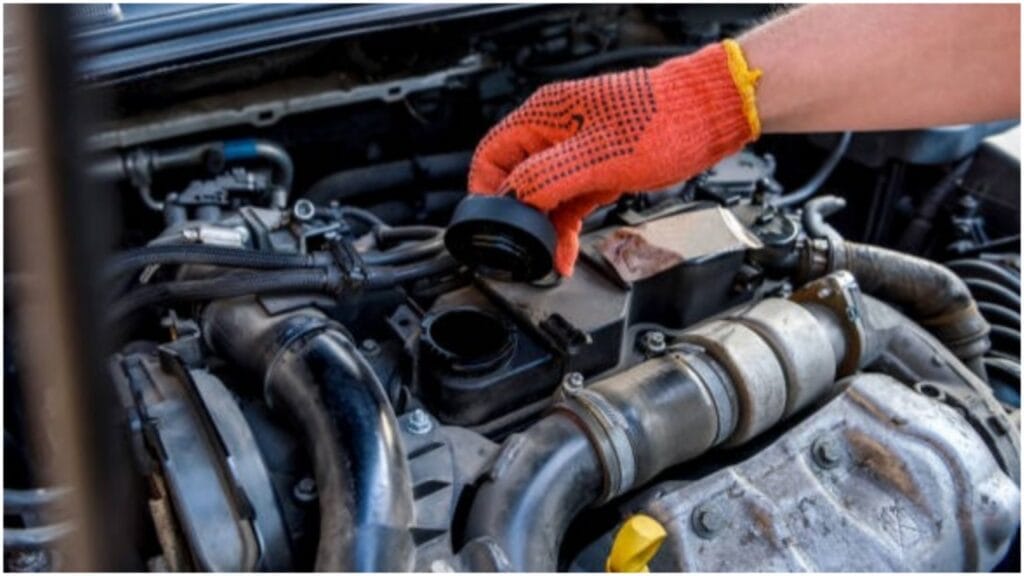Knocking can harm engines. It means uncontrolled fuel burning. Using the right oil helps. Thicker oils, like 10W-40 or 20W-50, can reduce it. High-mileage oils also work. They have additives to protect parts. Synthetics offer better film strength.
This reduces friction. Less friction means less knocking. The goal is to quiet the engine. Choose oil that matches your car’s needs. But if the noise is caused by a mechanical fault, oil is not the solution.We try to make everything a little easier and explain it in detail.
What is the function of engine oil?
Engine oil has several vital functions. It lubricates moving parts to reduce friction. This prevents wear and damage. Oil also helps cool the engine. It carries away heat from hot components. Furthermore, it cleans the engine by suspending dirt and sludge.
It protects against rust and corrosion. Finally, it creates a seal between piston rings and cylinder walls. This maintains compression and power. Regular oil changes are very important for engine protection.
why is it important to change your engine oil?
Changing engine oil is very important. Over time, oil becomes dirty. It accumulates metal particles and dirt. This makes it less effective at lubricating. Dirty oil cannot cool the engine well.
This results in increased friction and wear. This can lead to costly damage. Fresh oil protects your engine. It ensures smooth running and improved fuel economy. Regular oil changes solve your car’s engine problems.
Prevents Engine Wear and Damage
Engine oil forms a protective film. This film coats all moving parts. It stops metal from rubbing against metal. This reduces friction significantly. Less friction means less wear and tear. It prevents parts from overheating. This guards against costly engine damage. Regular oil changes maintain this protection.
Improves Engine Efficiency and Performance
Clean engine oil is vital. It reduces friction between moving parts. This allows the engine to run smoother. Less friction means the engine works less hard. This directly improves fuel efficiency. Your car uses less gas. It also boosts overall power output. Fresh oil ensures your engine performs at its best.
Maintains Engine Cleanliness
Engine oil acts as a cleaner. For example, it can clean dirt, mud, and small metal particles. These contaminants accumulate inside the engine. The oil suspends them. This prevents harmful deposits from forming. Dirty oil is removed during an oil change. Fresh oil keeps your engine clean.
What can happen if you don’t change the engine oil?
Neglecting oil changes causes major issues. Old oil becomes dirty and thick. It loses its ability to lubricate. This increases friction and heats the engine. Sludge forms, blocking vital passages. Engine parts wear down faster.
How often should engine oil be changed?
Always check your car’s owner’s manual. It provides specific recommendations. Most modern cars with conventional oil need changes every 5,000 to 7,500 miles. Synthetic oil can extend this to 10,000 or even 15,000 miles.
However, harsh driving shortens intervals. This includes short trips, heavy loads, or dusty conditions. Even if you drive little, change oil yearly. This prevents degradation over time.
Engine Oil Quality Tester
An engine oil quality tester basically works to check the condition of your engine oil. It is a small device. It measures contamination and degradation. It can detect impurities like dirt or fuel. It is also able to show if the oil is breaking down.
This can help you know when to change your oil. It prevents unnecessary changes. It ensures that your engine is protected. This tool acts as an engine oil tester.
How to check if engine oil is good or bad?
There are several ways to check your engine oil. First, use the dipstick. You need to pull it out and wipe it clean, then put it back in. Pull it out again. Look at the oil level and; it should always be between the marks. Next, check its color.
New oil is clear and amber. Old oil gets dark brown or black. Feel the oil between your fingers. Good oil feels smooth. Gritty oil indicates contaminants. A strong gasoline smell also suggests bad oil.
Which is the best engine oil?
The “best” engine oil depends on your car. Always check your owner’s manual first. It specifies the correct oil type and viscosity. Generally, synthetic oils offer superior protection. They perform better in extreme temperatures.
They also keep engines cleaner. Conventional oils are more affordable. They work well for older cars. High-mileage oils are for older engines. Look for API certifications on the bottle. These ensure quality and performance standards are met.
can an oil change fix rod knock?

An oil change cannot fix rod knock. Rod knock signals serious engine damage. It usually means worn connecting rod bearings. These bearings are critical metal parts. Fresh oil provides lubrication.
However, it cannot repair already damaged metal. While proper oil prevents wear, it won’t reverse it. A knocking engine needs mechanical repair. Ignoring it will lead to complete engine failure.
What to do when changing engine oil?
First, gather your tools. You’ll need new oil, a new oil filter, a wrench, a drain pan, and a funnel. Warm up the engine briefly. Then, safely lift your car. Place the drain pan under the oil plug. Remove the plug carefully.
Let the old oil drain completely. Replace the drain plug securely. Next, remove the old oil filter. Install the new filter. Finally, add the new oil. Check the dipstick to ensure the correct level. Only the ignorant can do this.
FAQ’s
Oil change time vs mileage
Engine oil needs to be changed based on time or mileage. Your car’s manual gives guidelines. Most modern cars go by mileage, often 5,000 to 10,000 miles. However, oil degrades over time, even if you don’t drive much.
Heat, cold, and short trips break it down. So, if you don’t reach the mileage limit, change your oil annually. This ensures optimal protection. Don’t solely rely on one factor.
How often to change synthetic oil in diesel?
Synthetic oil in diesel engines usually extends change intervals. For light-duty use, 10,000 to 15,000 miles is common. However, always consult your owner’s manual first. Severe conditions, like heavy towing, extreme temperatures, or frequent idling, shorten these intervals.
In such cases, 7,500 to 10,000 miles might be more appropriate. Regular oil analysis can precisely determine optimal change times. Don’t forget annual changes even with low mileage.
Engine knocking low oil fix
Engine knocking from low oil needs immediate action. First, check your oil level with the dipstick. If it’s low, add the correct type of engine oil at once. Bring the level to the “full” mark. This might stop the knocking if detected early.
Low oil causes metal parts to rub. This quickly damages crucial engine components, like rod bearings. Adding oil only helps if severe damage hasn’t begun. If the knock continues or is loud, mechanical repair is essential. This usually means replacing worn parts. Adding oil is a temporary solution for a deep-seated problem.
Engine knocking repair cost
Engine knocking repair costs vary greatly. It depends on the cause and severity. A simple fix, like a bad spark plug or knock sensor, might be a few hundred dollars ($200-$800).
However, if it’s “rod knock” from worn bearings, the cost jumps significantly. This is a major internal engine issue. Repairing a rod knock can range from $2,500 to $5,000 for a rebuild.
If the damage is extensive, an engine replacement might be needed. That can cost $5,000 to $10,000 or more. Labor is a big part of the expense. Getting a diagnosis from a trusted mechanic is crucial to determine the actual repair needed.
How long can you drive with rod knock?
You should not drive with a rod knock. It signals severe internal engine damage. Specifically, the connecting rod bearings are worn out. These bearings are vital for smooth engine operation.
Driving continues to damage them. This causes more friction and heat. Eventually, the rod can break. This leads to catastrophic engine failure. Your engine could seize completely.
This might happen without warning. You could lose power on the road. This creates a dangerous situation. Get your vehicle inspected immediately. Driving even short distances can be risky.
Conclusion
Our discussion covered vital aspects of engine oil. Oil lubricates, cools, cleans, and seals the engine. Regular oil changes prevent wear and boost efficiency. Skipping changes causes friction, sludge, and major engine damage.
Regarding engine knocking, especially rod knock, new oil cannot fix existing problems. Quality oil prevents wear, but won’t repair it. Adding oil might temporarily quiet a knock from low levels.
However, driving with a rod knock is extremely dangerous. It indicates serious internal damage. Repair costs are high. In sum, proper oil use is preventative care. It keeps your engine healthy. It is not a cure for established mechanical failures.

